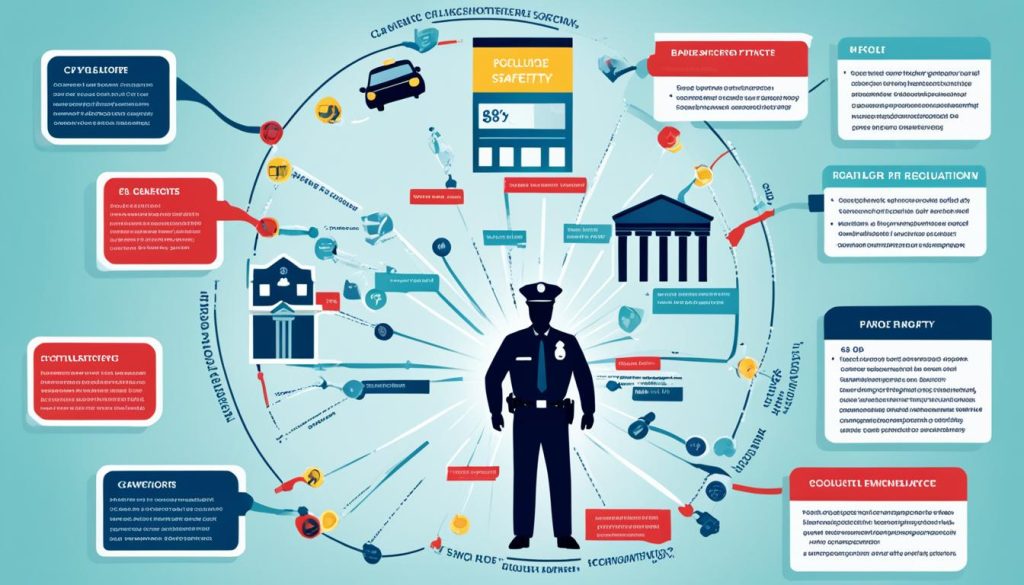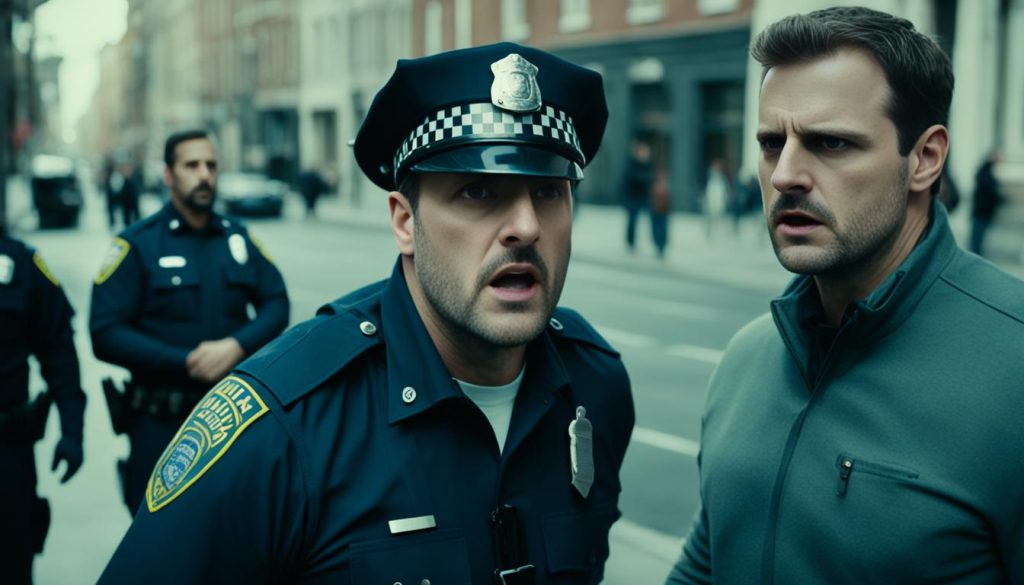Did you know that carding, the practice of police officers stopping and documenting individuals without any specific offense being investigated, has been officially banned in Ontario since January 1, 2017?
Carding refers to the arbitrary collection of identifying information by police, often associated with racial profiling. This controversial practice sparked widespread public concern and led to the implementation of Regulation 58/16, also known as the “street check” regulation.
In this article, I will guide you through the meaning and implications of carding and the regulations surrounding police interactions in Ontario. Whether you want to understand your rights, learn about the different types of police interactions, or know what to do if you feel mistreated by a police officer, this article has got you covered.
Key Takeaways:
- Carding refers to the arbitrary collection of identifying information by police, often associated with racial profiling.
- Regulation 58/16, also known as the “street check” regulation, was introduced to prohibit carding and protect the rights of individuals.
- There are three types of police interactions: “street checks,” informal interactions, and trespassing investigations.
- Body worn cameras are used by police officers to record their interactions with the public.
- If you feel mistreated by a police officer, you have avenues to file a complaint and seek resolution.
What is Regulation 58/16?
Regulation 58/16, also known as the “street check” regulation, was created by the provincial government of Ontario in response to the disproportionate stops of Black, Racialized, and Indigenous people in Toronto and other parts of Ontario. This regulation prohibits the arbitrary collection of identifying information by police, referred to as carding. It ensures that individuals have the right to refuse to provide any identifying information and be informed of the reason for the information collection. The regulation also requires police officers to offer a receipt of the interaction containing relevant details. It is important to note that Regulation 58/16 distinguishes between “street checks” and “informal interactions”.

Regulation 58/16 protects individuals’ rights and addresses the issue of disproportionate stops by police. It establishes clear guidelines for police officers and promotes transparency in their interactions with the public.
What is a “street check”?
“Street checks,” also known as Regulated Interactions, refer to when a police officer speaks to an individual for purposes such as investigating general criminal activity, inquiring into suspicious activities, or gathering intelligence. It is important to note that participation in a “street check” is voluntary, and individuals have the right to refuse to answer questions and walk away from the officer. If an officer asks for identifying information, they must inform the individual that providing such information is not required and provide a receipt of the interaction if requested. It is crucial to understand that “street checks” are not considered carding or informal interactions.

| Aspect | Carding Police Tactics | Street Checks |
|---|---|---|
| Voluntary Participation | No | Yes |
| Right to Refuse Answering Questions | No | Yes |
| Right to Walk Away | No | Yes |
| Required Identifying Information | Yes | Not Required |
| Receipt of Interaction | Not provided | Provided if requested |
| Relationship to Carding | Considered carding | Not considered carding |
What is an Informal Interaction?
An informal interaction refers to a non-investigative conversation initiated by a police officer with an individual. During such encounters, individuals have the right to inquire why they are being stopped and if they are free to leave. It is important to note that remaining silent is an option during an informal interaction, and officers must inform individuals about their rights to not answer questions and to leave. Whether a conversation occurs or not, both parties can separate and continue with their day. It is crucial to understand that an informal interaction is distinct from carding or regulated interactions.
Informal interactions serve as an opportunity for open dialogue and community engagement between the police and the public. They enable officers to establish rapport and address any concerns or inquiries individuals may have regarding their safety or the community. These interactions enhance mutual understanding and trust, fostering positive relationships between law enforcement and the community they serve.
Benefits of Informal Interactions:
- Builds trust and rapport between police and the community
- Provides an opportunity for open dialogue and mutual understanding
- Addresses community concerns and inquiries
- Enhances public safety through a proactive approach
It is important for both individuals and police officers to approach informal interactions with respect, patience, and a willingness to listen. By fostering an open and constructive environment, these interactions can contribute positively to community safety and harmonious relationships.
| Informal Interactions | Carding | Regulated Interactions |
|---|---|---|
| Voluntary conversations without investigative purposes | Arbitrary collection of identifying information | Police interactions for the purpose of general criminal activity investigation, suspicious activities, or intelligence gathering |
| Individuals have the right to inquire why they are being stopped and if they are free to leave | Occurs when an officer attempts to collect identifying information based on factors such as race, location, refusal to answer non-legally required questions, or attempt to discontinue the interaction | Individuals can voluntarily participate and ask for a receipt of the interaction if requested |
| Remaining silent is an option during an informal interaction | Considered illegal under Ontario law | Informal interactions are distinguished from both carding and regulated interactions |
What is Carding?
Carding refers to the arbitrary collection of identifying information by police, often associated with racial profiling. It occurs when an officer attempts to collect identifying information based on factors such as a broad race-based description, the individual’s presence in a high-crime location, the individual’s refusal to answer a non-legally required question, or the individual’s attempt to discontinue the interaction when they have the legal right to do so. It is important to highlight that Ontario law explicitly prohibits carding, considering it illegal.
| Carding Police Definition | Carding Police Meaning |
|---|---|
| The arbitrary collection of identifying information by police | The practice often associated with racial profiling |
| Occurs based on factors like race-based description, location, refusal to answer, or termination of interaction | Illegal and prohibited under Ontario law |
What is Trespassing?
Trespassing refers to being somewhere that an individual is prohibited from being, engaging in prohibited activity on private property, or remaining on private property after being directed to leave by the property’s occupier. Police officers have duties to investigate suspected trespassing situations and may ask individuals to demonstrate their right to be on the property. If an individual refuses to leave or stop engaging in prohibited activity, police can issue a Provincial Offences Act (POA) ticket or make an arrest. However, police should treat trespass arrests as a last resort and explore other options to address public safety concerns. It is crucial for individuals to be aware of their rights when it comes to interactions related to trespassing.
| Trespassing Offense | Consequences |
|---|---|
| Trespassing on private property | POA ticket or arrest |
| Engaging in prohibited activity on private property | POA ticket or arrest |
| Remaining on private property after being directed to leave | POA ticket or arrest |
Body Worn Cameras
Police officers use body worn cameras to document their interactions with the public. These cameras serve as a crucial tool in enhancing transparency and accountability. Typically, officers turn off the cameras during routine patrols or casual conversations. However, the cameras are activated during investigative or enforcement encounters, as well as when responding to service calls.
The use of body worn cameras may vary depending on the guidelines and procedures implemented by each police department. Individuals may have concerns about their privacy and being recorded by an officer’s camera. In certain circumstances, such as when in a private space, individuals have the right to request that the camera be turned off.
However, it is important to note that officers are generally authorized to record interactions that occur in public spaces. This helps ensure the accuracy of events and can provide valuable evidence in case of disputes or legal proceedings.
Body worn cameras are an important tool in modern policing, aiding in the documentation and review of police interactions with the public. They encourage transparency, protect both officers and citizens, and contribute to the overall improvement of police practices.
Benefits of Body Worn Cameras
- Accountability: Body worn cameras hold both police officers and citizens accountable for their actions during a police interaction.
- Evidence: The recorded footage can serve as valuable evidence in criminal investigations, disciplinary proceedings, and court cases.
- Transparency: Body worn cameras promote transparency and trust between the police and the community by providing an unbiased account of events.
- Training and Evaluation: The footage captured by body worn cameras can be used for training purposes and evaluating police practices to identify areas for improvement.
- Reduced Complaints: Studies have shown that the presence of body worn cameras can lead to a decrease in complaints against police officers.
What should I do if I feel mistreated by a police officer?
If you believe you have been mistreated by a police officer, it is important to take appropriate action. You have several options available to address your concerns. Firstly, you can file a formal complaint with the Office of the Independent Police Review Director. This independent body will thoroughly investigate your complaint and take appropriate action if any wrongdoing is found.
In addition, you can also file a complaint with the Human Rights Tribunal of Ontario if you believe your mistreatment was based on discrimination or a violation of your human rights. This tribunal has the authority to hold individuals accountable for their actions and provide remedies for any harm caused.
If you would prefer to address your concerns directly with the specific police service involved, you can file a complaint with them as well. It is crucial to document the incident in detail and gather any evidence that supports your complaint, such as witness statements, photographs, or videos.
Furthermore, if you have concerns about your privacy or would like access to the information collected by the police during the incident, you can file a privacy complaint or request your personal information from the Access and Privacy Section of the specific police service. If you are not satisfied with the response or resolution provided, you have the right to appeal to the Information & Privacy Commissioner of Ontario.